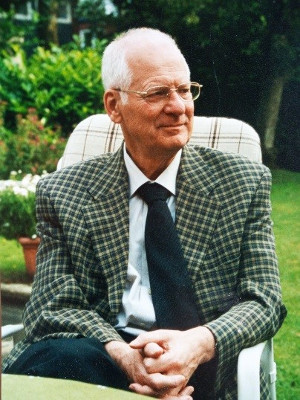 Kristen Rohlfs (Photo courtesy of Ralf-Jürgen Dettmar
Kristen Rohlfs (Photo courtesy of Ralf-Jürgen Dettmar
Kristen Rohlfs
Contributed by T.L: Wilson, R-J. Dettmar, and R.Wielebinski
Kristen Rohlfs was born on May 13, 1930 in Humptrop, North Frisia, a small village in the German-Danish border area. There he went for some time to a Danish school and was fluent in Danish. After finishing high-school in 1950 in Germany, he was very happy to be accepted by the University of Hamburg to study physics and mathematics. At Hamburg Observatory he attended courses by Prof. Otto Heckmann, who later became the founding Director General of the European Southern Observatory (ESO) and president of the IAU. Prof. Heckmann stimulated his interest in astronomy and became his supervisor for the state examination for high school teachers in 1956 with a cosmological topic. At that time, Prof. Heckmann was already involved in the site testing for ESO and Kristen Rohlfs joined an expedition to South Africa in 1956/57. After returning to Hamburg, Prof. Heckmann also became Kristen Rohlfs PhD supervisor and in 1961 he defended his thesis on the dynamics and evolutionary state of the open stellar cluster NGC 7789.
A position at the University of Bonn where the 25m Stockert radio-telescope was operated since 1955 made Rohlfs change his scientific interests to the physics of the interstellar medium and in particular to the cold neutral medium observed by means of the neutral hydrogen line at 21cm. After his Habilitation, he became a lecturer at the University of Bonn in 1965 and left for Australia to work with CSIRO to use the Parkes telescope for HI absorption line spectroscopy in 1966/67. Back in Bonn he became involved in the planning of the 100m Effelsberg radio-telescope for which the Max-Planck Institute for Radioastronomy (MPIfR) was founded under the directorship of Prof. O. Hachenberg. Rohlfs joined the MPIfR staff in 1968 working on the technical side on the computer control system of the telescope.
Scientifically he became interested in the spiral density wave theory with applications to the structure of the Milky Way. This interest made him start a lecture series on this topic and after teaching the course in 1973 as guest professor in Copenhagen (in Danish) the material was published in the Lecture Notes Series by Springer.
In 1974 he accepted a full professorship in astrophysics at Ruhr University Bochum where he soon served as chair of the faculty of physics and astronomy (1977-78). In the following years teaching was very important to him and the carefully prepared material for a radio astronomy course eventually became the textbook Tools of Radio Astronomy. The first edition in 1986 was well received and a second edition, with T. L. Wilson, was published in 1996. For the 5th edition Susanne Hüttemeister was added as a co-author. Meanwhile a 6th edition is available - a textbook that has become the standard.
Kristen Rohlfs retired from the professorship in 1994 but continued to work, not only on the various editions, but also on his popular book in German Die Ordnung des Universums.
Kristen Rohlfs passed away on Dec. 10, 2017 in Bochum.
Modified on Monday, 14-Feb-2022 12:14:09 EST by Ellen Bouton, Archivist (Questions or feedback)
|
![[IAU logo]](iau_wb_thumb.jpg)
![[URSI logo]](URSI-logo-thumb.jpg)
![[Karl Jansky at his antenna]](jansky_photo_02_thumb.jpg)
![[Reber's Wheaton antenna]](Reber_Telescope_Wheaton_thumb.jpg)
![[Dover Heights]](Dover_Heights_02_thumb.jpg)
![[4C telescope]](GB61-195_4C_telescope_thumb.jpg)
![[Ewen and horn antenna]](ewen_horn1s.jpg)
![[Dwingeloo, 1956]](Dwingeloo-1956-thumb.jpg)
![[Jocelyn Bell Burnell and Cambridge antenna used in pulsar discovery]](burnell2_thumb.jpg)
![[Lovell Telescope at Jodrell Bank]](site_1594_0001-500-334-20180316163019-thumb150.jpg)
![[Wilson, Penzias, and Bell Labs horn antenna]](wilson-penzias-horn_thumb.jpg)
![[6-m Millimeter Radio Telescope in Mitaka, Japan]](6m-thumb.jpg)

